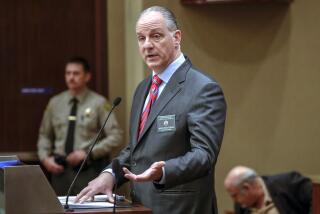Thornburgh Defends Tightening Justice Dept. Press Contacts : Media: An irritated attorney general brushes aside reporters’ complaints. But only hours later he orders the Bureau of Prisons to withdraw tight rules on interviews with prisoners.
WASHINGTON — Atty. Gen. Dick Thornburgh on Wednesday defended his drive to tighten up on the release of information to the press, saying that the Justice Department “leaked like a sieve when I got here” and must be forced to speak with “one voice” on policy matters.
In an unusual exchange with reporters, an obviously irritated Thornburgh brushed aside complaints that his press restrictions have cut the flow of basic public information about department actions, not just leaks about criminal investigations.
“We try as best as we can, consistent with the peculiar responsibilities of this department . . . that make us much less forthcoming, much less glib (than other Cabinet agencies) about making characterizations, assertions about breaking news,” Thornburgh said.
He disclosed that under his orders, David Runkel, his chief spokesman, has been drawing up new “media guidelines,” which all of the department units, including the FBI, Drug Enforcement Administration, Immigration and Naturalization Service and Marshals Service, will be required to follow.
Thornburgh said that his concern over leaks led him to order a department-wide review of information policy, which he expects to reduce leaks of pending criminal investigations and bring officials in line with his “admonition that we speak with one voice on policy matters.”
Thornburgh and Runkel defended the department’s new emphasis on already existing rules channeling department information through official spokesmen and discouraging discussions between investigating agents and line attorneys with reporters. In the past, these rules have often been widely ignored.
“On policy matters or respecting investigations, agents are not the proper people to be discussing those things,” Thornburgh said.
However, several hours after his spirited defense, Thornburgh ordered the U.S. Bureau of Prisons to withdraw stringent limits on press interviews with prisoners that it had proposed and which touched off his latest clash with the press over information policy.
“This proposal was submitted prematurely and without my personal review,” Thornburgh said of the prison bureau’s rules. They would have restricted press access to inmates and allowed wardens to ban reporters who fail to “verify any allegations” about federal prisons with “authorized” prison officials.
The proposed limits “will be subject to further review before resubmission,” Thornburgh said.
Runkel said that the new prison rules violated the “no surprises” rule, a reference to Thornburgh’s order that he not learn of department actions first through press reports.
It was disclosed at the briefing that the INS, under its new director Gene McNary, had issued rules Monday sharply limiting information that officials outside Washington can give to reporters.
Anything but the “most routine” information must be cleared with regional INS officials and matters “more significant” have to be cleared with the public affairs office in Washington, an INS spokesman said.
Thornburgh’s discussion of the information limits came as he appeared for only the second time--”my irregular unannounced visit,” as he described it--at the daily press briefing Runkel conducts. He came to call attention to a 30.6% increase in the department’s budget for fiscal 1990, according to Runkel, but the discussion of press restrictions dominated the session.
Despite repeated assertions that the new press policies had interfered with the dissemination of ordinary, not sensitive information, Thornburgh insisted that his concern was with disclosure of information from investigations still under way.
“I would think somebody might be concerned about the rights of individuals who may or may not be charged as the result of an ongoing investigation,” Thornburgh said. “These are the persons whose concerns we share as well.”
He said that he had ordered a number of leak investigations “in hopes that we can raise the deterrent factor so people will feel less free to compromise investigations and the rights of potential subjects of those investigations.”
“You may not like it,” the attorney general told reporters, thrusting his open hands toward them in a blocking motion. “But to me it is a position not only defensible, but it would be indefensible otherwise. . . .”
Thornburgh’s orders on restricting information have touched off limits that go further than he has discussed. For example, an Oct. 13 memo from an official of the office of justice programs informed employees that “unauthorized communications with Congress or the news media, particularly those they themselves initiate, can place them in a precarious position.”
Patricia K. Howard, acting director of the office’s unit on congressional and public affairs, also said in the memo that employees are required to keep records on all outside contacts “covering any official business of the agency.”
More to Read
Get the L.A. Times Politics newsletter
Deeply reported insights into legislation, politics and policy from Sacramento, Washington and beyond. In your inbox three times per week.
You may occasionally receive promotional content from the Los Angeles Times.










